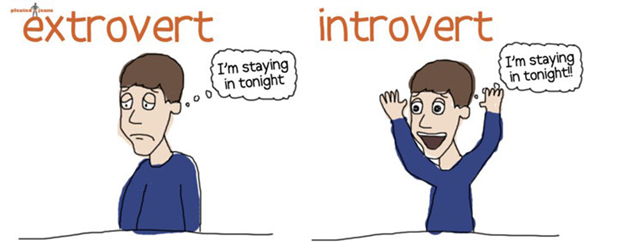By Rania Tsoli,
One should always attempt to accept the things they cannot change about themselves as they are; striving to better themselves in a healthy manner, however, is perfectly normal, and should be vividly encouraged. Self-improvement is a crucial part of becoming capable of forming successful relationships of all sorts, not only with others but – most importantly, one might say – with ourselves as well. However, it is one thing to improve our flaws and a whole other thing to, slowly but surely, completely disregard our personality, while trying to drastically change in a way that can prove to be harmful both mentally and emotionally. Truth be told, the line between the two is quite thin.
If you enjoy exploring the personality spectrum, you might be familiar with the terms “introvert” and “extrovert”. Take a dive into the world of self-improvement, and you will most definitely stumble across a source urging introverts to overcome their timidness and be more extroverted – like it is that simple! And I wonder: why is introversion always viewed merely as something to be changed and rarely, if ever, as something to be embraced? How come there is little to no advice on how an extrovert can be more reserved? More subtle? And, dare I say, more introverted?

Let us start with the basics: what exactly do the words “introvert” and “extrovert” mean? By the term “introversion”, we refer to the orientation toward the internal private world of oneself, and one’s inner thoughts and feelings, rather than toward the outer world of people and things. It is a broad personality trait and exists on a continuum of attitudes and behaviors – introversion itself is not a measurable personality trait; rather, it refers to low levels of extroversion. Introverts are relatively more withdrawn, quiet, and deliberate; they may tend to adopt more skeptical views or positions and prefer to work independently. On the other hand, we have the term “extraversion” (or “extroversion”, which is more common nowadays), which we use to express the orientation of one’s interests and energies toward the outer world of people and things rather than the inner world of subjective experience. Just like introversion, extroversion is a broad personality trait and exists on a continuum of attitudes and behaviors. As opposed to introverts, extroverts are relatively outgoing, gregarious, sociable, and openly expressive.
To put it simply, being an introvert can be hard. Introverts are very often expected to change themselves at the drop of a hat, but what is socially acceptable is sometimes different from what they find comfortable for themselves. What seems to be effortless for an extrovert can be quite a difficult task for an introvert. For example, late parties and informal get-togethers are the sorts of activities that people are expected to happily participate in, but an introvert can often find all this draining. As a result, they are very often misunderstood. Deliberate rudeness is inferred, and the fact of the matter is –more often than not– lost in translation. That is why introverts should, as hard as it might be, try to gradually improve their social skills, even to a small extent; because at the end of the day, as Aristotle once wisely claimed, “Man is by nature a social animal”. Even the most independent and lone wolf, as opposed to what they might think, needs others in their life. One should always respect their own boundaries, but they should never get too comfortable with traits that might occasionally be holding them back. Refusing to change because you have grown too fond of what you find familiar promotes, unfortunately, nothing but constant social –therefore, often emotional and intellectual– stagnation, which can prove to be very harmful to creatures as naturally social as humans.

So, we have established that being more of an introverted person is pretty difficult sometimes. But, if just being an introvert is hard, being an introvert among extroverts that cannot or do not find the need to understand how an introverted mind works is ten times harder. We should get one thing straight: extroverts trying to tone down their loud, bold attitude from time to time is just as necessary as introverts putting in the effort to be more approachable in order for the first to help the second out, and vice versa. This way, both would have an improved set of social skills, a more “universal” one, if you will; one that would, to an extent, make them capable of catering to the needs of an introvert, as well as those of an extrovert. Social butterflies that they are, extroverted people often do not seem to grasp the fact that, with their voluble and eager way of approaching others, they can often be a bit overwhelming to a person that is more on the reserved side. Claiming a subtler, calmer, and generally, more balanced attitude can help extroverts not only successfully coexist with introverts but understand them on a deeper level as well.
Loud and talkative, outgoing and sociable, enthusiastic and action-oriented; extroverts are truly amazing – and introverts are just as beautiful. They are thoughtful and gentle, independent and empathetic, they observe the littlest of things, and they know when to talk and when to simply listen. Be a little patient, and they can turn into the warmest, liveliest of people; they just need some peace and quiet, a bit of space, and a slower pace every now and then. Give them some time, and they will open up to you sooner or later – take it from an introvert.
References
- What an introvert is – and isn’t, healthline.com, Available here
- Definition of “introversion”, dictionary.apa.org, Available here
- Definition of “extraversion”, dictionary.apa.org, Available here
- Why life is harder for introverts, riadalwani.medium.com, Available here




